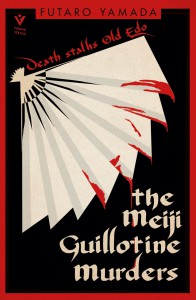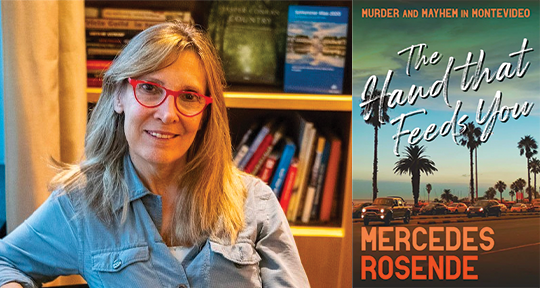Exciting destinations are in your future with these selections from some of the most delightful new publications in world literature. Futaro Yamada takes us back to nineteenth century Japan with a scintillating mystery of imperial intrigue and murderous plots; and Eric Hazan takes us along the streets and districts of a Paris as seen by one of its most vital figures: Honoré de Balzac. Read on to find out more, and bonne journée!

The Meiji Guillotine Murders by Futaro Yamada, translated from the Japanese by Bryan Karetnyk, Pushkin Vertigo, 2024
Review by Mary Hillis, Educational Arm Assistant
A driverless rickshaw, a bizarre sighting through binoculars, a corpse holding its own head—these are a just few of the perplexing scenarios that Chief Inspectors Toshiyoshi Kawaji and Keishirō Kazuki investigate in The Meiji Guillotine Murders by Futaro Yamada (pen name of Seiya Yamada).
The story begins in Japan after the Boshin War, in which the several domains fought against the Tokugawa Shogunate to restore imperial rule. During the Meiji period, strides to modernize the country continued, resulting in tumultuous changes to the economy, politics, and society. As officers of the Imperial Prosecuting Office, Kawaji and Kazuki are concerned with these developments, especially the role of justice within the new government. Both men are dedicated to their convictions, and early in the novel, Kazuki contends:
Corruption is, after all, the muddying of the distinction between the public and the private, between right and wrong. That’s why the public lost faith in the shogunate. Truly, it’s a good thing that it fell. And yet, the newly formed government is already showing signs of corruption. You ought to know this better than anyone. Otherwise, what was the point of our revolution? Or will there be another, and then another? Would it not be absurd to go on repeating it for all eternity? The government doesn’t exist merely to protect the people. Its aim must be the embodiment of justice.
One way Yamada renders this transformation and the accompanying influx of imported ideas and innovations is through the characters. Kawaji is based off of a real-life figure, the eponymous man who traveled as part of the Iwakura Mission to study systems in Western countries, and who is recognized as the founder of the modern police force in Japan. Kazuki, meanwhile, is a fictional character who returns to Japan from France to introduce the guillotine, and as the book’s title suggests, its chilling presence looms over the novel. There is a great deal of curiosity surrounding the new execution device, and when it is demonstrated at the prison, he addresses the doomed inmate:
“You are to be put to death, but in this enlightened age you shall be beheaded in the French fashion,” Kazuki boomed, as he clutched the hanging rope. “At least you shall have the honour of being the first in Japan to be subject to an experiment of this kind.”
In addition to Kawaji and Kazuki, another recurring character is Esmeralda Sanson, a French woman with an interesting family background. She is in the country working on translation projects; nevertheless, local residents are surprised to hear her speaking Japanese or singing ancient kagura songs. Often dressed as a shrine maiden, her features are captivating and give her an aura of mystique.
To Kawaji, her wide blue eyes seemed like a pair of mysterious jewels. Though he had seen them before, he could not help feeling mystified that such a beautiful creature could exist upon this earth.
After the introductory chapters, Kawaji and Kazuki investigate a confounding series of murders which juxtapose the old and the new: “A Strange Incident at the Tsukiji Hotel”; “From America with Love”; “The Hanged Man at the Eitai Bridge”; “Eyes and Legs”; and “The Corpse that Cradled its own Head.” Each begins with an excerpt from their reports filed with the Imperial Prosecuting Office, and finishes with a dramatic appearance by Esmeralda. These five baffling cases drive the narrative forward until they are ultimately connected and resolved in the final chapter. READ MORE…








